Life on the ‘Biggest Little Farm’: behind the scenes of a biodynamic blockbuster
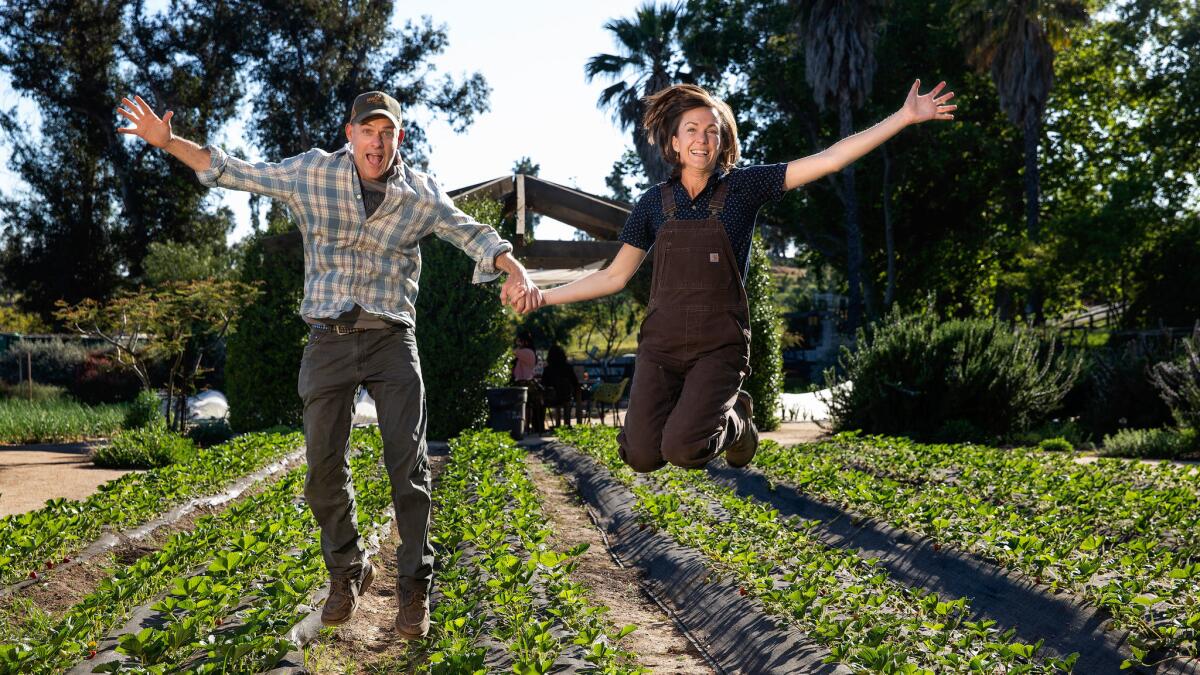
- Share via
At 6:30 every Monday morning, the 60-member team at Apricot Lane Farms in Moorpark gathers around a campfire in the vegetable garden to discuss what happened over the weekend — maybe a lamb was born, or thousands upon thousands of ladybugs made their seasonal return to the rows of fennel — and what’s on the agenda for the week ahead.
It sure beats a conference room.
Located 40 miles north of Los Angeles in Ventura County, Apricot Lane Farms symbolizes what so many of us daydream of doing: ditching city living, a monotonous desk job and commuter headaches for a back-to-basics lifestyle, say, on a farm. (It’s enough of a fantasy that ABC has a prime-time comedy with that very premise, called “Bless This Mess.”)
John and Molly Chester are living that dream: They left behind their day jobs in L.A. — as a docu-series director and a personal chef, respectively — and have spent the last eight years turning the dry, nutrient-depleted dirt of a former horse ranch into a self-sustaining, biodynamic 213-acre farm that produces fruit and vegetables for some of L.A.’s trendiest restaurants and freshly laid eggs that sell out in minutes at local farmers markets, and embraces topsoil practices that are said to help combat climate change.
“We endured the anxiety of whether it would work,” John Chester said. “You can very easily forget why it is so special when you are mired in the details and the monotony.
Few people would want to document one of the most stressful and humbling periods of their life, but over the last eight years, Chester and a crew of interns and professional movie makers, captured the journey in gorgeous, unflinching detail in “The Biggest Little Farm,” the award-winning documentary opening in theaters May 10.
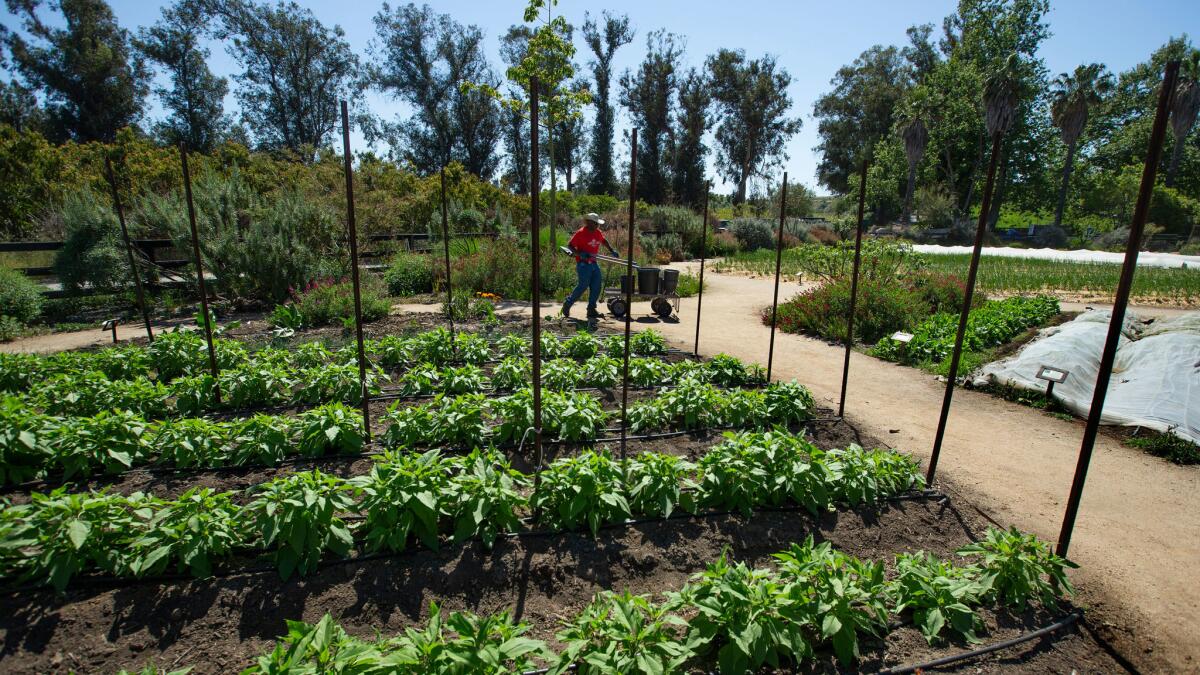
Life on a farm has always lived at the intersection of hard work and faith, and Molly Chester said there is a lot to be learned in that space. “It’s so good for surrender, for control personalities,” she said. “It’s a bit of a zen practice.”
Review: ‘The Biggest Little Farm’ is a winning doc about a couple’s agricultural dream »
After driving through gridlocked Los Angeles traffic, however, and arriving at the farm on a soft spring afternoon as new lambs played in an orchard laced with wildflowers and the scent of sage and citrus blossoms mingled on a gentle breeze, it was hard to imagine the harsher realities.
FARM LIFE
Apricot Lane is one of only 66 farms in California to be certified biodynamic by Demeter U.S., representing the oldest agricultural certification program in the world.
Achieving success was a trial-and-error process that took years of hard work, significant investment from a venture capitalist Chester declines to name, and what the couple calls tenacity.
That’s because biodynamic farms are intended to establish uniquely different microclimates and native habitats, which means there is no handbook for how to do it. It’s a holistic approach in which every animal, plant, pest and poop on the farm serves a purpose — everything contributes to a self-sustaining life cycle. There are also no added hormones, synthetic pesticides or fertilizers or GMOs allowed.
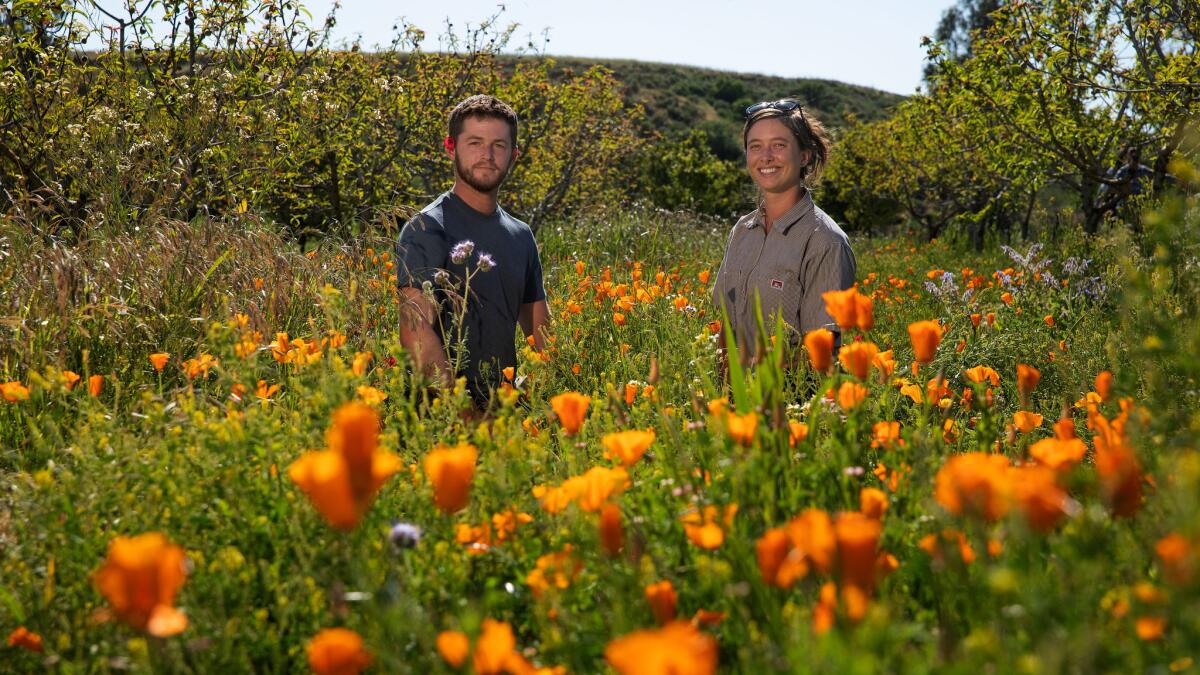
The farm produces more than 100 different vegetables, such as broccoli, asparagus and spinach, and 75 varieties of fruit annually including avocados, stone fruits and customer favorites: Autumn Gold oranges and Tropic Snow peaches, because variety allows for a healthy, diverse ecosystem.
A typical work day starts at 6:30 a.m. and ends at 4 p.m., seven days a week. And even in this certified organic paradise, there are still literal time clocks to punch. Staffers in charge of seasonal orchards or animals typically work six days a week.
Lunch for farm volunteers, apprentices and full-time employees is rustled up daily by a head chef, Kayla Webb, who picks seasonal produce from the garden and relies on farm eggs, meat, and milk (the last from Maggie the brown Swiss dairy cow).
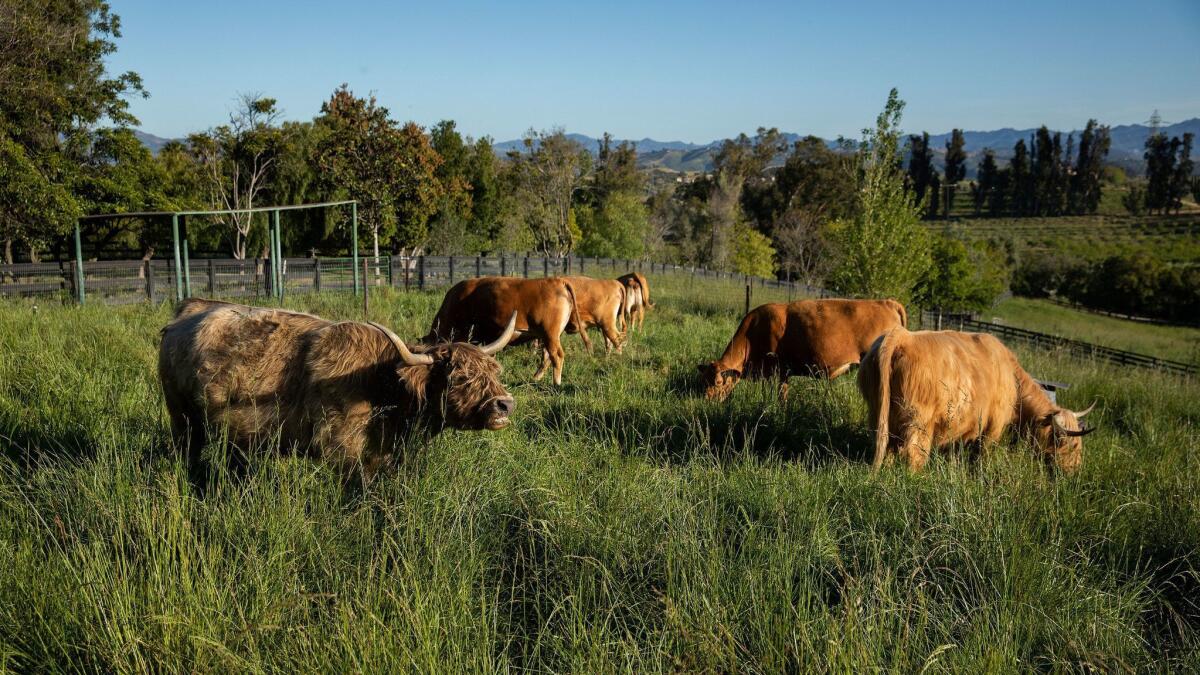
In between campfires and organic lunches, however, there’s a lot to be done on a working farm that includes Scottish Highland cattle, Dorper sheep, chickens, ducks, dogs, and bees from rescued hives — not to mention the volunteer cast of coyotes, snakes, mountain lions, gophers, slugs and egrets.
The celebrity, though, is Emma, the 700-pound star swine of the film and the heroine of John Chester’s first picture book in a three-book series, “Biggest Little Farm, Saving Emma the Pig,” out Tuesday.
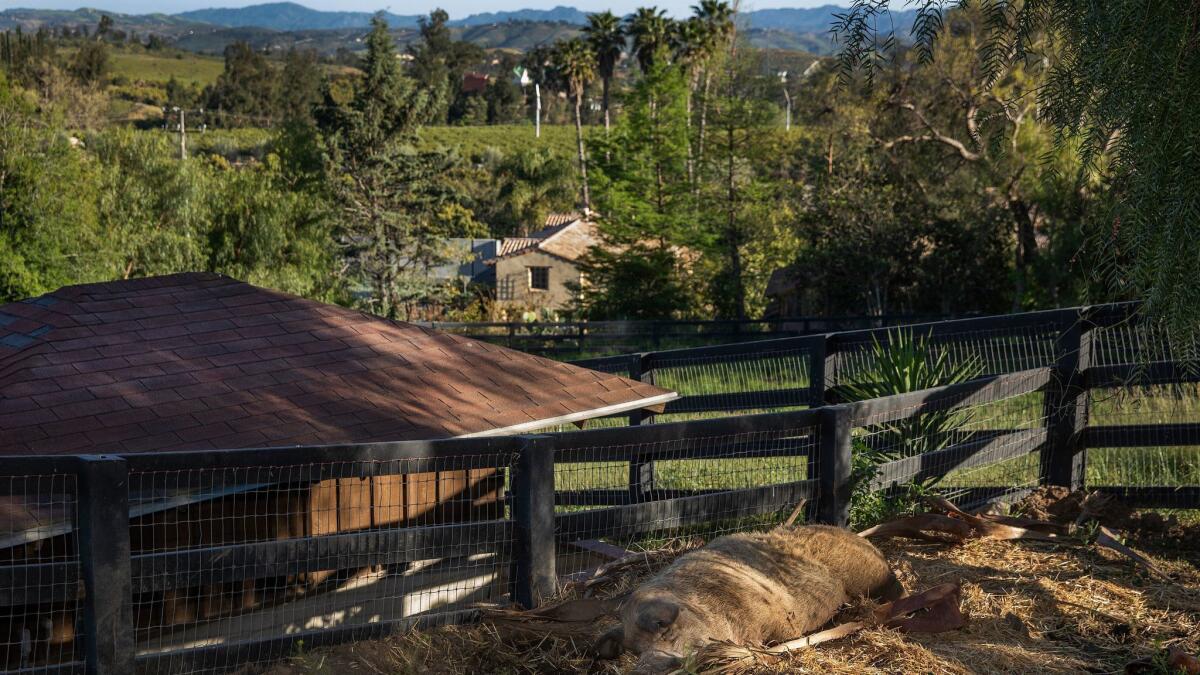
BEAUTY IS, AS BEAUTY DOES
A biodynamic farm doesn’t look like its commercial or even organic neighbors.
Instead of a single crop, this type of farm plants dozens of different produce and thousands of plants including diverse crops of grasses, legumes and weeds. The “cover crops,” which look like accidental, unkempt rows within orchards and fields, play a key role in storing atmospheric carbon dioxide within the soil, sometimes referred to as “carbon sequestration,” another way that Chester said the farm fights climate change.
Chester refers to his 4-year-old son, Beauden, when he adds, “I feel like at least he won’t be angry with us for not trying.”
In addition, 10% of a certified biodynamic farm must be set aside for native habitat restoration — which in the Chesters’ case includes a pond, which is said to be the largest privately owned native restoration project in Ventura County, complete with a floating island covered in native grasses and trees, making it a habitat for birds, butterflies and other pollinators.
“I think one of the most beautiful things about Apricot Lane Farms is that John Chester has such a visual mind,” said Erin Sojourner, director of business development for Demeter U.S. “The design of their farm is just gorgeous,” said Sojourner of the property that looks like a patchwork quilt from the air. “They come from an angle that really helps the beauty of the farm express itself.”
Of course, no one knows the photogenic qualities of the farm better than John Chester himself, but he says the bucolic beauty is first and foremost the byproduct of a business on a mission.
“The return to this type of farming isn’t just about nostalgia,” Chester said. “It should be beautiful, but it is also quite necessary.”
Like 85% of all farms in California, Apricot Lane is a small-scale farm, defined by the U.S. Department of Agriculture as earning at least $1,000 in gross income, but not more than $250,000.
Chester said Apricot Lane is fortunate to have investors who understand the long-term financial opportunities of a self-sustaining farm. Of course, it doesn’t hurt that the farm has managed to gain so much fanfare that it has featured video segments on Oprah’s Super Soul Sunday channel.
The farm’s fruits, vegetables and related products are sold at weekly farmers markets, and are available online and at retailers and restaurants including Erewhon, Farmshop, Gjelina and Salt & Straw.
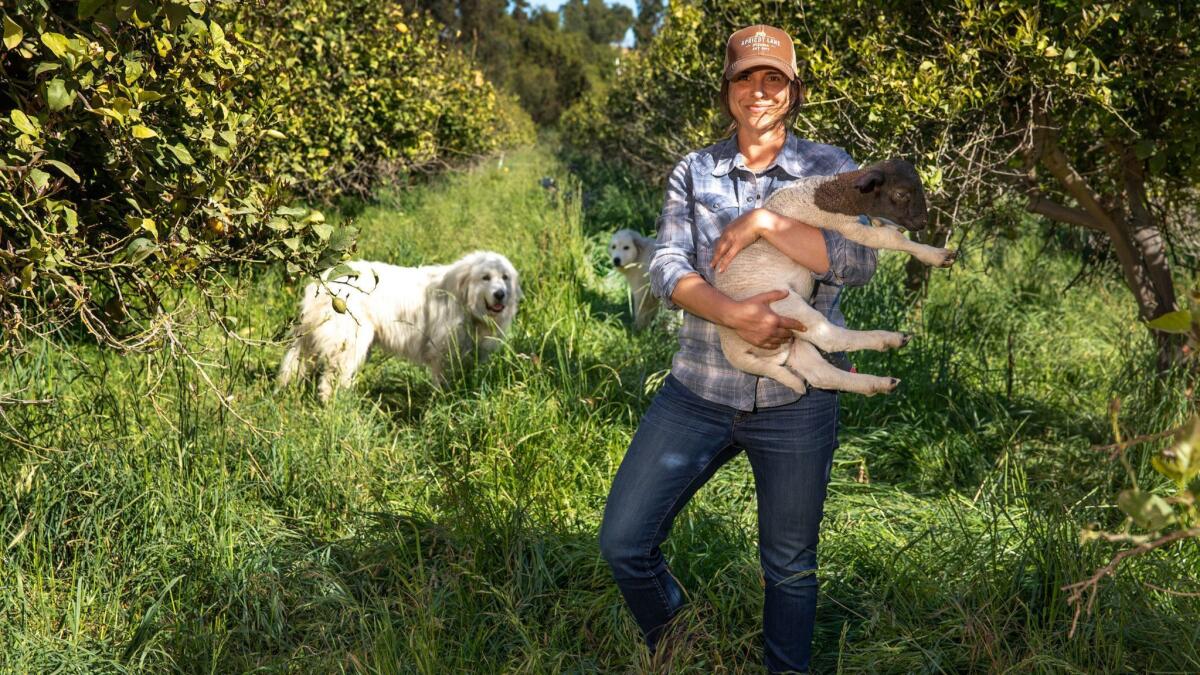
Their eggs, priced at $15 a dozen, have a cult-like following. “People are lined up almost an hour before the farmers market opens,” said Sandra Keats, the film’s producer, “and usually the eggs are sold out within the first half-hour.” Adding more chickens to the farm would make more money, but it would also alter the delicate balance of the ecosystem, and ultimately change the eggs. And the Chesters aren’t willing to do that.
Molly Chester is also producing Apricot Lane Farms Avocado Oil ($50) and Apricot Lane Farms Bourbon Lemon Marmalade ($21), and has a “Biggest Little Farm Cookbook” in the works. “It’s going to be like a scrapbook of the years in the movie,” she said.
WWOOF’ing it
On the day we visited, she gave us a tour of the farm’s current kitchen space and her adjacent office located inside what used to be the farm manager’s house. Pulling a carafe of fresh kombucha, homemade seed crackers and a glass container of Flavio’s Guacamole (a cookbook recipe shared by special projects manager Flavio Vidales) from a large, stainless fridge, she and John led us outside onto a red-tiled covered patio overlooking the restored pond complete with wooden dock and rowboat.
One wall of the porch is covered by snapshots of farm hands. The farm couldn’t exist without them. Many are volunteers from World Wide Opportunities on Organic Farms, called WWOOFers, who work three to six months at farms such as Apricot Lane in exchange for room, board, education and experience. Some ended up accepting full-time positions. (“We think of ourselves as the matchmaking service between people who want to go out and live and learn on farms and the host farmers themselves,” said outreach program manager Tori Degen.)
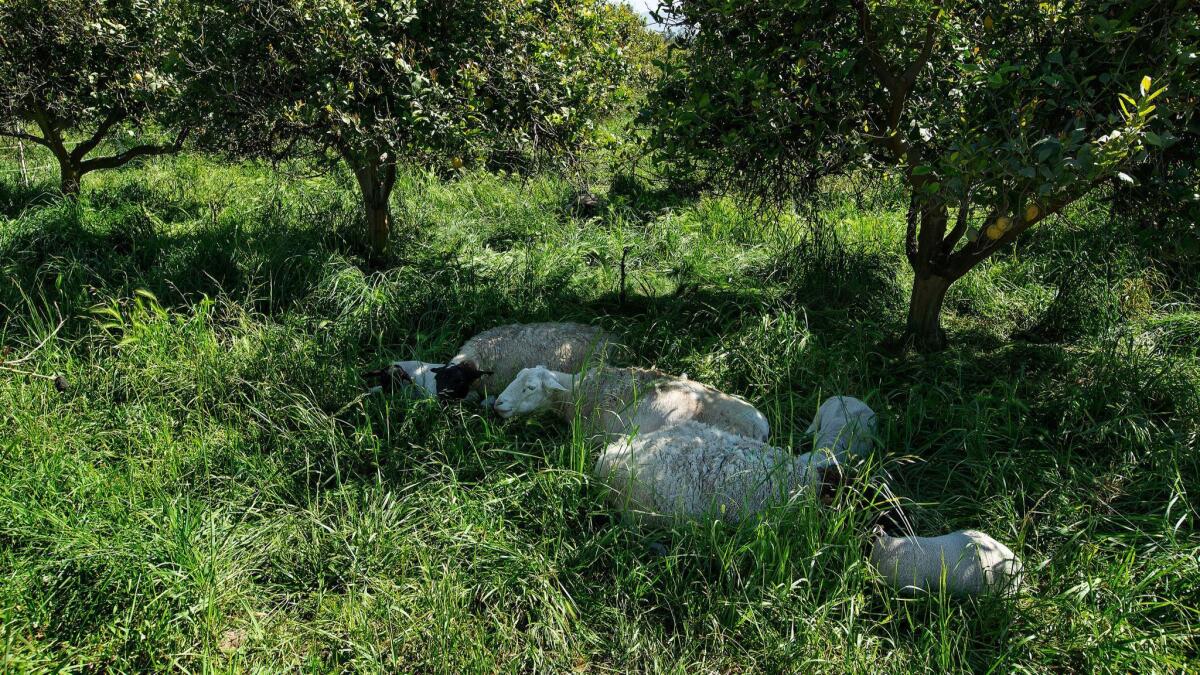
The Chesters said that even after eight challenging years without a proper vacation, they remain devoted to their path.
In fact, they are playing the long game: They have literally planted acorns, aiming for oak trees — which can live for over 400 years, with a single tree feeding a community of native wildlife.
John Chester said that after taking a break from filmmaking following the movie, he just put a camera back in his truck.
“I was just starting to feel inspired again,” he said. “Everyday, there is something new if you’re looking.”
Tour Apricot Lane Farms
Want to experience farm life firsthand and meet Emma the Pig in real life? Go to ApricotLaneFarms.com to schedule a 2-hour, moderately strenuous tour, $25. Bring water, walking shoes, hat and sunscreen.
Farm-to-Film
Special screenings of “The Biggest Little Farm” followed by Q&A sessions with John and Molly Chester are scheduled on the following dates. Go to BiggestLittleFarmMovie.com/tickets for more information.
7:30 p.m. Thursday at The Landmark, Los Angeles
7:30 p.m. Friday at The Landmark, Los Angeles
2:30 p.m. Saturday at The Landmark, Los Angeles
7:00 p.m. Saturday at The Arclight, Hollywood
4 p.m. Sunday at The Arclight, Hollywood
Bonnie McCarthy contributes to the Los Angeles Times as a home and lifestyle design writer. She enjoys scouting for directional trends and reporting on what’s new and next. Follow her on Twitter @ThsAmericanHome
ALSO
How designer Nate Berkus blended old and new in his L.A. kitchen remodel
They found a real estate unicorn: A house with great ‘bones,’ ready for decorating
You’ve never seen a kitchen island sink like this
How online art galleries are serving up talent — and sales — without the ‘tude
More to Read
Sign up for The Wild
We’ll help you find the best places to hike, bike and run, as well as the perfect silent spots for meditation and yoga.
You may occasionally receive promotional content from the Los Angeles Times.






